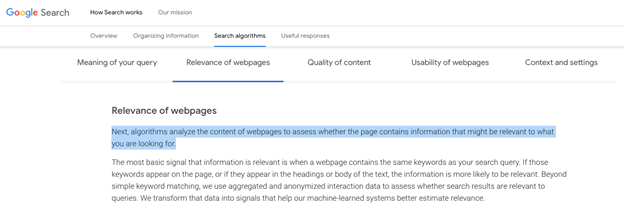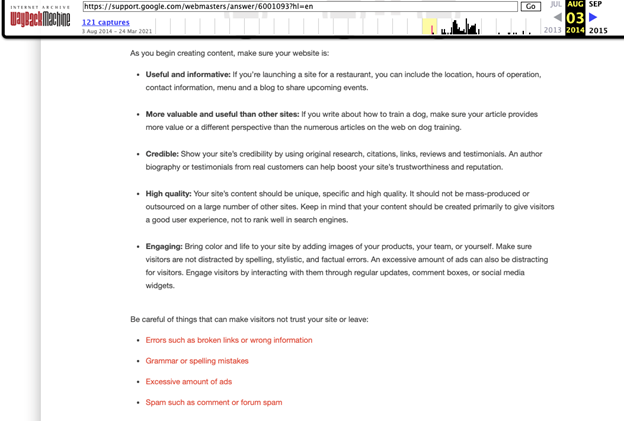Content As A Google Ranking Factor: What You Need To Know
No doubt, content is an integral part of your digital marketing and SEO strategies. You cannot do SEO without something to put on the page.
You can’t offer value or engage your audience with no text, imagery, audio, or video on the page.
But is content a ranking factor in Google’s search algorithms?
The Evidence For Content As A Ranking Factor
Content is foundational to how search works – and it features heavily in Google’s own “How Search works” resource:

Once Google understands the meaning of the query – the searcher’s intent – content is analyzed to determine each page’s relevance.
Which content characteristics matter (and how much) vary for different types of queries. This is why Google has higher standards for Your Money, Your Life (YMYL) content, as it can potentially impact a person’s wellness or livelihood.
Check out this Google Webmaster Tools online course on how to make a great site, as it appeared in 2014 (the page has since been redirected).
The module’s lessons were:
- 1.1 Determine if you want a website.
- 1.2 Set up a new website.
- 1.3 Identify your audience.
- 1.4 Create valuable content.
- 1.5 Organize your site structure.
- 1.6 Quiz.
The “How to make a great site” module was incredibly simple – set up a site, know your audience, create valuable content, have a good site structure.
That sure suggests that content must have been a pretty important ranking factor.
And here’s what Google wanted you to know about what it considered valuable content at that time:
 September 2021
September 2021
Not much has changed, really. Google is looking for value, credibility, specificity, good user experience, etc.
We see these themes again in the Beginner SEO resources at Google Search Central:
 Screenshot from Developers.google.com, September 2021
Screenshot from Developers.google.com, September 2021
In this section, Google also recommends that you:
- Write easy-to-read text.
- Organize your topics clearly.
- Create fresh, unique content.
- Act in a way that cultivates user trust.
- Make expertise and authoritativeness clear.
- Provide an appropriate amount of content for your subject.
- Avoid distracting advertisements (prevent them from consuming the site’s content).
- Use links wisely.
We see these themes throughout the Quality Raters Guidelines, as well. I evaluated whether those are a ranking factor in another chapter (they’re not).
But the Raters Guidelines go into great detail about what Google is looking for as far as the Expertise, Authoritativeness, and Trustworthiness (E-A-T) of content, and how it is determined.
Now, you could read all of that and come to the conclusion that Google still hasn’t implicitly said that content is a ranking factor.
But in a 2016 Google Q&A with Ammon Johns, Rand Fishkin, and Eric Enge, Google Search Quality Senior Strategist Andrey Lipattsev flat out told us what the top 3 ranking signals are.
Ammon John asked,
“We’ve heard that this (RankBrain) is the third-most important signal contributing to results now. Would it be beneficial to us to know what the first two are? Could webmasters build better sites?”
Lipattsev responded,
“Yes. And I can tell you what they are. It’s content and links pointing to your site.”
He then clarified that “there is no order,” so it’s not a numbered list of 1. Ranking Factor = Content, 2. = Links, 3. = RankBrain.
Instead, different aspects of the algorithms are involved at varying levels depending on the query.
So while it’s safe to say that content, links, and RankBrain were the top three ranking factors at that point in time, it doesn’t mean content was the #1 factor, or that those are the top three today.
Getting more recent, then; in an August 2020 Webmaster Central video, John Mueller said in response to a question about H1 tags:
“Headings on the page are not the only ranking factor that we have — we look at the content on its own, as well.”
The Evidence Against Content As A Ranking Factor
There really isn’t any.
You can’t have search without content.
Content is foundational to how search works, it’s examined in many different ways by Google’s search algorithms, and content is a ranking factor.
Content As A Ranking Factor: Our Verdict
Google uses content as a search ranking signal.
Google uses many aspects of that content to gauge whether it is the best answer for a relevant query, so simply having average content is not enough.
Focus on the elements that make your content exceptional if you want it to perform in search.
Subscribe to our newsletter here.